|
They are as American
as baseball and apple pie: The U.S. film and music industries
lead entertainment trends throughout the world and remain
the benchmark to which other countries’ efforts aspire.
Along with other copyright industries, they contribute
billions of dollars to the U.S. economy, outperforming
other sectors and playing an increasingly leading role
in the growth of exports.
Two GW alumni lead
these industries in top positions. While there may be nothing
more “American”
than Hollywood, there’s nothing more “GW” than
a prime lobbying job—especially in Washington, where
one of these men leads his organization just a few blocks
from campus.
They both have one other common bond.
Their industries have been threatened—by the same technology
that also spreads their good work all over the world at lightning
speed. Both men discuss that threat here, along with how they
ended up in the middle of this fight for their industries’ lives.
Not in Kansas Anymore
By Tom Nugent
Former
Agriculture secretary turned Motion Picture Association
of America President Dan Glickman, JD ’69, relishes
the challenges
ahead.
When the news broke last summer that Dan
Glickman had been tapped to replace the legendary Jack Valenti
as the next Hollywood ambassador to the U.S. government, more
than a few movie industry observers expressed feelings of
overwhelming befuddlement.
With George W. Bush in the White House and
strongly favored to remain there, and with the Republicans
firmly in command of Congress for the foreseeable future,
why would the moguls of the Silver Screen choose a former
Democratic congressman from Kansas—and a former secretary
of Agriculture, of all things—to be their next Capitol
Hill point-man?
An unlikely sounding scenario? You bet.
Before deciding to retire last year at age 82, the impeccably
groomed and fiercely charismatic Valenti had spent 38 years
as one of the nation’s most effective lobbyists. Secure
in the power of his trademark smile, Valenti by 2004 had become
a Washington institution.
Before departing the scene, however, the
lobbying legend would apply his persuasive power to one final
task: choosing his replacement. Who would win this coveted
job as the high-powered voice of the motion picture industry?
May I have the envelope, please? And the
winner is … the longtime farm-state legislator from Wichita:
Dan Glickman!
Go figure.

Dan Glickman stands in the Arterberry
farm outside Newcastle, Okla., in July 1998 during a
tour to see the effects of that summer’s drought.
Glickman served as Agriculture secretary from 1995 to
2001.
J. Pat Carter, AP/WWP
|
At first glance, most veteran Washington
observers were totally flummoxed by the choice. Let’s
face it: Unlike Valenti, Glickman does not number dazzling
personal charisma among his political assets. A smallish,
balding man who tends to wear dark, square-cut suits and narrow,
earnest ties, the 60-year-old Kansan is quick to concede that
the decision to make him the next president and CEO of the
hugely influential MPAA “probably startled a few people
in Washington, at least when they first heard about it.”
Glickman himself often sounds surprised
to have landed his new high-profile job as the Hollywood PR
Czar. “A few weeks after I was chosen to head the association,”
he told GW Magazine in a recent interview, “the
editors at The New York Times decided to run a profile
of me.
“When the piece appeared a few days
later, I noticed that on the left-hand side of the page was
a big picture of Jack Valenti with [famed Italian actress]
Sophia Loren at the Cannes Film Festival. On the right-hand
side, they ran a photo of me and [87-year-old] Senator Robert
Byrd going through some cornfield in West Virginia.
“I took one look at that layout, and
I realized that I’m never going to be Jack Valenti. Hey,
Jack is Jack, and I’m me. I’ve got heartland roots,
and I hope they’ll always be part of me. And I’m
also convinced that those roots are going to help me on this
new job.”
While touting his heartland credentials—“I
represented the reddest of the red states, and the movie people
are well aware of that”—Glickman also points to
his track record during nearly six years (1995-2001) in the
top job at the Department of Agriculture. “I had to manage
100,000 employees and a $70 billion annual budget on that
job, and I like to think I met the challenge,” he says.
After spending the past six months answering
the same basic question from reporters—“Why did
Hollywood pick you?”—Glickman has assembled a list
of reasons why his selection made very good sense, at least
from Hollywood’s point of view.
Valenti is one of these reasons. Valenti
hasn’t made this point public, but everyone in the industry
understands that Valenti had total veto power over the selection
and that he leaned toward Glickman because of his political
and international trade experience (especially with China).
It didn’t hurt, either, that former Lyndon B. Johnson
aide Valenti was—like Glickman—a passionate Democrat.
During 18 years in the House of Representatives,
Glickman became known for an ability to “work both sides
of the aisle” to gain nonpartisan support to push important
legislation through the pipeline. He also knows U.S. copyright
law inside-out and the Byzantine process that will be required
to get new anti-piracy laws through Congress. While serving
for many years on the House Judiciary Committee, he specialized
in technical and intellectual property ownership issues. His
legal skills will aide the MPAA’s number-one requirement
in 2005: finding a way to stop the movie pirates, who are
stealing an estimated $3 billion from the big studios each
year, Glickman says, by copying VHS tapes and DVDs, and downloading
and file sharing movies at an alarming pace.
Glickman also has personal links to the
movie industry. His son, Jonathan, is a Hollywood producer,
with comedies such as Shanghai Knights and the Rush
Hour series
to his credit. In addition, Glickman’s wife, Rhoda, was,
for 15 years, the director of the Congressional Arts Caucus,
where she coordinated Capitol Hill movie screenings hosted
by Valenti.
Lastly, Glickman says, he loves to go to
the movies. He isn’t lying when he brags about attending
“at least 50 new movies each year.”
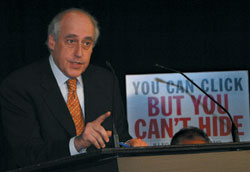
In November in Los Angeles, MPAA
President Dan Glickman warns that his industry plans
to sue people who illegally distribute movies online.
Stefano Paltera, AP/WWP
|
One veteran Washington insider who says
he wasn’t at all surprised by Glickman’s ascension
last July to his $1.5 million-a-year MPAA post is Sen. Pat
Roberts (R.-Kan.). After working closely with Glickman on
farm legislation for many years and watching him run the Department
of Agriculture with a “firm, steady hand,” Roberts
says he was quick to give the former Clinton cabinet member
“a very positive reference” when the MPAA recruiters
called him for a candid assessment of Glickman’s administrative
and political skills.
“I don’t always agree with Dan,
but I gave him a great reference, anyway,” joked the
longtime Republican. “I told them that even though he’s
a Democrat, I recommend him highly. It used to be said that
[running] Agriculture is the toughest job in Washington—and
I told the headhunter that if Dan could handle that job, I
don’t think he’ll get ambushed at the MPAA.
“Of course, I suspect he’ll have
to face some very big egos in the movie industry, but I’m
sure his background in politics has prepared him for that.”
Another well-connected Washington politico—eight-term
Rep. Richard Neal (D.-Mass.), a high-ranking member of the
House Ways and Means Committee, which could have a significant
role in economic decisions affecting the movie industry in
the years ahead—points to Glickman’s easygoing leadership
style. “Dan was an extremely intelligent legislator and
a savvy strategist,” Neal says, “but he’s also
blessed with a good sense of humor. He doesn’t take himself
all that seriously—which makes him very good at building
coalitions and achieving consensus.”
As a young boy in Wichita, Glickman couldn’t
get enough of the movies—and of “that delicious,
aromatic popcorn they sold in the lobby of our neighborhood
theater,” he says.
The movie house was the Crest, located six
blocks from Glick-man’s boyhood home. Glickman says he
rarely missed a Saturday afternoon in “that magical setting,
where dreams came alive on the screen and you could escape
from the everyday world for a couple of hours, just by purchasing
a 25-cent ticket.
“I must have caught all 26 of the Flash
Gordon serials, along with every one of the old Atom
Squad adventures. I know I’m dating myself a little
bit here, but the fact is that as a kid in Kansas, I really
loved the movies. Growing up in the 1950s, in a place like
Wichita … you have to remember that TV wasn’t as
big a part of our lives as it is now. For us, going to that
movie theater was a big, big thing.
“In our family, there was another interesting
twist, when it came to the movies. My dad, Milton—he
absolutely loved movie popcorn. They cooked it in coconut
oil, or maybe it was palm oil, back in those days. Anyway,
he was sure that it tasted better as a result—and almost
every night, he’d send one of us three kids down to the
theater for a box of that popcorn. They all knew the Glickman
kids at the Crest Theater, let me tell you.”
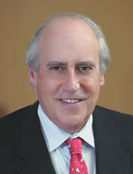 |
Glickman also remembers his time at GW fondly.
“I wasn’t that great of a law student. I did okay,
I guess, but nothing special. [Actually, he graduated with
honors.] And every once in a while, my shortcomings as a student
would become extremely obvious—especially during the
criminal law course I took with Professor James Starrs. During
my time, he was a lot like that law professor in the movie,
The Paper Chase. He was a terrific teacher,” Glickman
says. “I also learned a lot about civil procedure from
Professor Jerome Barron, who went on to become dean of the
Law School.”
These days, after six months on the job
at MPAA, Glickman says he’s having more fun than he ever
expected.
“It’s true that I face a lot more
stress here than I did at the Department of Agriculture,”
he points out, “even though I’ve only got about
250 employees and a budget in the tens of millions [of dollars],
instead of $70 billion.
“One of the reasons for the higher
stress is that here I’ve got many, many bosses [the movie
producers], whereas at the USDA, I basically had one boss,
the President of the United States. Of course, the MPAA is
also facing some tough survival issues, such as the piracy
problem, along with many difficult technological and international
trade issues. This job is extremely challenging on a lot of
fronts, which is the main reason I like it so much.”
Another pleasant job perk, Glickman says,
is the opportunity to rub shoulders with megawatt movie stars
now and then.
So what’s it like to spend an occasional
hour or two in the company of folks like Jack Nicholson, Brad
Pitt, and Julia Roberts? Does the former Kansas farm legislator
ever feel shy or intimidated around these world-class celebrities?
“Oh, I don’t think so,” Glickman
chuckles. “You know, I’ve lived long enough to know
that you just can’t let yourself be intimidated by people,
including movie stars. In my line of work, what you end up
learning is that most people are pretty much the same—some
are more beautiful than others, that’s all.
“I’m very respectful around the
stars but not intimidated. I’m smart enough to know that
if Brad Pitt walks in the door and Senator [Arlen] Specter
or Senator [Orrin] Hatch also walks in, I have to show as
much or more respect to the Hatches and Specters of the world
as I do to Brad Pitt.”
The Music Man
By Tom Nugent
Neil Portnow, BA ’71, knows
a thing or two about the music biz.
For Recording Academy President Neil Portnow,
the long climb to the top began with a GW bullhorn.
He remembers the moment vividly: He picked
up the bullhorn and leaned out the third-floor window of Maury
Hall at 19th and G Streets on the campus of GW. Twenty feet
below, a surging mob of angry students chanted again and again:
“One, two three, four … We don’t want your
dirty war!”
It happened on a crisp fall afternoon in
1969, when the president of the GW Student Association—a
charismatic senior named Neil Portnow—decided it was
time to “get negotiations started, before a complete
riot broke out” at Maury, then a frequent target of anti-Vietnam
War demonstrators.
Without hesitating, Portnow lifted the hastily
commandeered bullhorn to his lips. “All right, everybody:
We need to think seriously about our actions before somebody
gets injured. I want to tell you that I’ve spent the
past two hours talking with the administration, and they are
ready to negotiate!”
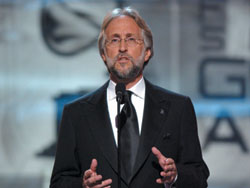
Neil Portnow addresses the audience
and millions of TV viewers during the GRAMMY Awards
in February.
Courtesy
of The Recording Academy, Photo by Wireimage © 2005 |
On that breezy autumn afternoon, Neil Portnow
spent nearly an hour in the window of Maury Hall, doing his
best to broker some crucially important negotiations between
outraged student demonstrators and administrators who were
doing their best to keep their university functioning at the
height of the Vietnam War.
“Attending GW in the late 1960s and
early 1970s was an amazing experience,” says the 56-year-old
Portnow, today the president of the National Academy of Recording
Arts & Sciences Inc. (known as The Recording Academy).
“From one hour to the next, you didn’t know if the
school would even remain open for classes. Washington was
full of anti-war activists, and life on campus seemed increasingly
chaotic.
“Of course my own personal politics
were left of center. I’d been in several peace marches,
myself. At the time, however, I was serving as student body
president, which meant I had a responsibility to keep the
lines of communication open to the University administration.
In some ways, I saw myself as an undergrad version of Henry
Kissinger—a negotiator whose task was to try and get
everybody to cool the rhetoric and stand down a notch. At
the same time, though, I was also urging the administration
not to overreact by bringing in the D.C. police and the tear
gas.
“That standoff in the window lasted
quite a while—but in the end, we managed to get the negotiations
started, and order was eventually restored.”
Pausing for a moment, The Recording Academy
president chuckles with light-hearted nostalgia. “Looking
back on that showdown at Maury Hall, I guess you could say
it was where I first began to work on my skills as a negotiator
in a crisis situation.”
Since then, he has spent more than 30 years
in the music business—as a performer, as a marketer,
and as an administrator. “I do think the ability to negotiate
between different groups is the key to any success I’ve
been able to achieve,” he says.
As a hugely successful record company executive—think
Zomba, Arista, EMI, RCA, and Twentieth-Century Fox—Portnow
long ago proved he had the magic touch required for selling
millions of songs by such superstars as Whitney Houston, Britney
Spears, the Backstreet Boys, and R. Kelly.
These days, just about everybody in the
music business knows that Portnow has an extraordinary ability
to negotiate between the big-time music creators (including
such over-the-top writer-producers as Max Martin, Robert John
“Mutt” Lange and Teddy Riley) and the tens of millions
of worldwide music consumers who pay the bills.
Indeed, The Recording Academy acknowledged
Portnow’s obvious talents as a marketer and manager when
it tapped him in 2002 to replace the legendary C. Michael
Greene, who had just departed the 18,000-member Academy after
14 years as its often outspoken and controversial chief executive.
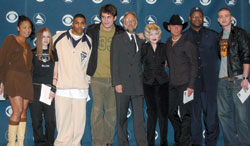
Neil Portnow stands in the middle
of a star-packed linuep after reading nominations for
the 2003 GRAMMY Awards at New York’s Madison Square
Garden. (from left:) Ashanti, Avril Lavigne, Nelly,
John Mayer, Neil Portnow, Cyndi Lauper, Kenny Chesney,
Jimmy “Jam” Harris, and Justin Timberlake.
Richard Drew, AP/WWP
|
Having established an enviable track record
as a high-voltage marketer and administrator at half a dozen
major record companies, Portnow was an obvious choice for
the high-six-figure-a-year top job at the Academy, according
to industry insiders. “Neil comes to us with superb credentials,”
said Academy Board Chairman Garth Fundis soon after the GW
grad’s ascension to the corner office, “and he has
a unique skill set that perfectly matches what we were looking
for in a new president.”
A bit more than two years after his selection,
Portnow continues to prove that the industry execs who backed
his candidacy got it right.
Under his steady hand, the Grammy® Awards
music special—by far the biggest enterprise launched
by the Academy each year—has improved dramatically, according
to most of the national critics. Ask key industry figures
such as RCA Label Group Chairman Joe Galante to evaluate the
yearly shows, and many will tell you that last February’s
extravaganza (featuring the irrepressible Queen Latifah as
emcee and other stars such as Green Day, Kanye West, and Alicia
Keys) may have been the best-produced Grammy spectacle in
the entire 47-year history of the event.
Says the Nashville-based Galante, “Neil
has done a tremendous job of reaching out to people. He’s
gregarious, and he really enjoys telling the world about the
artists the Academy represents. He also loves to get out there
in the music community and ask people about their issues—because
he wants to learn all he can about every aspect of our industry.”
Portnow’s influence isn’t limited
to the big recording studios where writers and performers
spin their magic. Ask California congresswoman Mary Bono (she’s
from Palm Springs, and she knows a thing or two about music)
to describe Portnow’s performance as a member of her
recently formed Recording Arts and Sciences Congressional
Caucus and the well-known widow of former singing star Sonny
Bono won’t hesitate.
“Neil is a powerful advocate for musicians
and writers in America,” says Bono, who co-chairs the
caucus and passionately supports its mission to protect the
rights of musicians, songwriters and singers from “copyright
pirates who illegally download music from the Internet.”
“Neil does a great job on that issue—and he also
understands the complexities of the [Capitol] Hill,”
she says. “In his job as Academy president, he has to
negotiate between two worlds that are often at odds: Hollywood
and Washington. But he does it very well. His communications
skills seem to be natural—he’s charismatic and also
extremely knowledgeable.
“Thanks in large part to Neil’s
energy and dedication, we are beginning to educate the American
public about the vital importance of respecting copyrights
and intellectual property rights in this country.”
Most people in the music business know Portnow
for his skill as a creative executive, marketer, and negotiator.
But only a few of the performers he represents know that the
Academy president, himself, once dreamed of topping the charts
as a bass player and guitarist.
For Portnow, who grew up in the middle-class
community of Great Neck on New York’s Long Island, the
musical passion began in earnest one night in the mid-1950s,
when a brand-new phenom named Elvis sang a tune called “Hound
Dog” on the Ed Sullivan TV show.
|
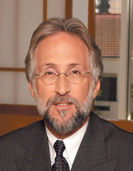
Courtesy of The Recording Academy,
Photo by Wireimage © 2005
|
“I was raised in a family that had
a great love of music,” he says. “As soon as I was
old enough as a child, my parents started taking me to performances
by the Great Neck Symphony Orchestra on Sunday nights. And
at first, it was: ‘Aw, mom—do I have to go?’
But pretty soon I started getting excited about music, all
kinds of music. And about the same time, I caught one of those
Ed Sullivan Shows with Elvis, and that did it for me. ‘Hound
Dog’! And I started bugging my parents for a guitar.
I was eight years old, and I was already asking for guitar
lessons.
“I got very interested in jazz guitar—performers
like Wes Montgomery and Charlie Christian and Joe Pass. And
at the age of 12, I formed my own band at school. I played
in bands all the way through high school and college—including
a long stint for The Savages, a group I founded and managed
for several years.”
By the time he hit GW, however, Portnow
had already begun to ask himself if he belonged onstage as
a performer or backstage as a marketer of other performers.
“I woke up one day and realized that I was torn between
my music and my interest in politics and business. By then
I was involved in booking concerts for bands at GW, and I’d
already been elected student body president. I wanted very
much to run for political office and save the world! And the
practical side of me felt that a musical career was going
to be less likely, so I better have something solid that I
could really get into that was a little more, ‘legitimate!’”
What followed, of course, was a remarkable
run as one of the most successful music executives in the
annals of contemporary music. By the late 1990s, the fleet-footed
Portnow had risen to senior vice president of operations for
the giant Zomba Group on the West Coast, where he also spent
a lot of time as a volunteer leader for The Recording Academy.
“When I look back at the early years,”
he says, “I realize that the ability to negotiate between
different groups has undoubtedly been the key element in my
professional life, and that it all got started at GW.”
These days, his toughest challenge can be
defined in a single word: “piracy.”
As the point man for the 18,000 music writers
and performers in his organization, it’s his responsibility
to lead the battle—in Congress and elsewhere—to
prevent further erosion of music copyrights and intellectual
property rights in this country, due to the high-tech banditry
that he says is now occurring daily on the Internet.
“Right now, the Academy is doing its
best to educate people—and especially younger people—about
the importance of respecting copyrights, and that isn’t
easy. One of the problems has been that it’s quite easy
for the kids to go out and buy high-tech equipment that allows
them to do the [illegal] downloading and file sharing.
“We’re trying to change behavior
that’s been established in some young people for a while,
and we’re hoping to educate for the future. As for the
lawsuits recently filed… well, once in a while, maybe,
you take out the stick and somebody gets a little slap on
the behind. Unfortunately, that’s sometimes a necessary
part of changing behaviors. The Academy’s Rule is to
use education as a tool for change.”
Is Portnow confident that the pirates can
be stopped, and that the future of commercial music in America
remains as bright as ever?
“You bet,” he says. “I’m
a real optimist when it comes to thinking about our industry’s
future. Let’s face it: Good music is more available today
than ever before, and millions of consumers worldwide are
enjoying it on a scale never seen before.
“As an industry, we have to sit down
and figure out a new business model—and we will. I see
some very good days ahead for music-lovers and music-creators
alike, well into the future.”
A Shared Crusade
When Neil Portnow took the stage at the
Grammy awards this year to deliver his annual speech as president
of The Recording Academy, he was doing his part to fight music
piracy. As part of a promotion for a star-studded tsunami
relief song, he touted the availability of the song on iTunes,
a legal venue for downloading music on the Internet.
While Portnow’s industry was the first
to face the threats that piracy, particularly the newer threat
posed by illegal downloading from the Internet, Dan Glickman’s
motion picture industry shares the same challenge. For both
men, the issue is at the forefront of survival of the businesses
they represent.
“In the past, copyright piracy has
been a much bigger problem for the music industry than for
Hollywood,” Glickman said about his industry in December,
just after announcing that the Motion Picture Association
of America had just filed dozens of lawsuits against Internet
thieves who allegedly steal Hollywood movies and then share
them online. “But with the rapid development of movie-replicating
and file-sharing technology, all of that is about to change.
This is the biggest threat now facing the
film industry, by far, he says. It’s a dagger at the
heart of the movie business, and if we’re going to defend
ourselves against it, we have to put together the right combination
of aggressive legal action and education.”
Both men are watching an impending decision
from the Supreme Court, which in December agreed to review
a key case that likely will determine whether such Internet-based
file-sharing enables as “Grokster” and “Morpheus”
will be held financially responsible for losses, if their
services are found to have contributed to movie piracy. At
this magazine’s press time, the Court was scheduled to
review the case in late March.
A positive outcome from the Supreme Court
could help Glickman’s industry tremendously. “The
average movie today costs $103 million to make, and six out
of 10 of them don’t make that money back. Making movies
has become incredibly expensive—and that’s why preventing
piracy has become so crucial.”
On the music side, much has changed since
services like Napster first came online a few years ago, offering
Internet surfers free access to music downloads. These days,
Napster is a revamped, fee-based service (as is the Mac-based
iTunes), that allows users to buy song downloads for 99 cents
and albums for $9.95. For its part, GW, as part of a select
group of universities, is participating in a pilot program
for the 2004-05 academic year that allows 7,100 residence
hall students to have complimentary subscriptions to Napster.
GW also monitors network traffic to enforce legal downloading
policies.
It was the music industry that first began
the barrage of lawsuits within the past two years aimed to
curb Internet piracy. “The lawsuits sent America a powerful
message: If you are file sharing copyright-protected music,
you are breaking the law,” says Mitch Bainwol, chairman
of the Recording Industry Association of America (which represents
the record companies), who is Portnow’s Washington counterpart
in the crusade against illegal downloading.
Bainwol says he’s glad to have Portnow
as a partner in his battle against Internet piracy. “Neil
is a very thoughtful—and persuasive—ally in the
ongoing effort to educate America about this issue,”
he says. “As an advocate for musicians everywhere, he
has been a powerful voice in support of the copyright and
intellectual property rights that are guaranteed to all of
us by the Consitution.”
—Heather O. Milke and Tom Nugent
Back to top |
Spring/Summer 2005 Table of Contents
|